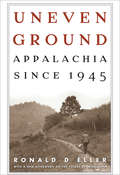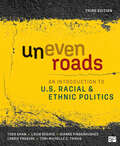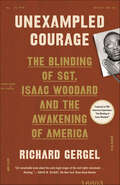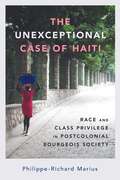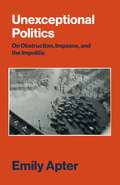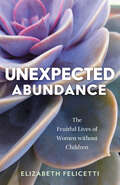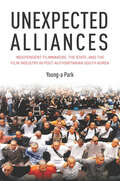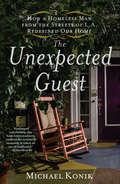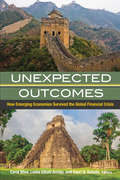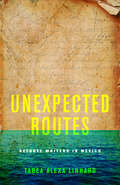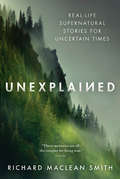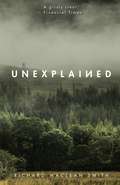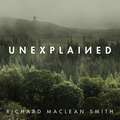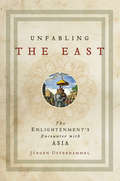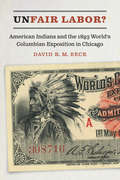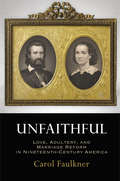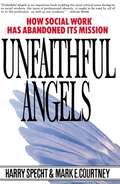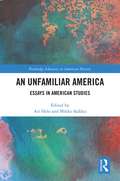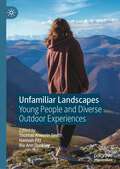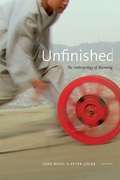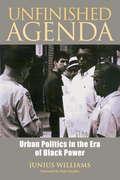- Table View
- List View
Uneven Ground: Appalachia Since 1945
by Ronald D. EllerThis award-winning history examines the politics of progress in America through a close look at industrial development in Appalachia since WWII.Appalachia has played a complex role in the unfolding of American history. Early-twentieth-century critics of modernity saw the region as a remnant of frontier life that should be preserved and protected. However, supporters of material production and technology decried what they saw as a the isolation and backwardness of the region and sought to “uplift” its people through education and industrialization.In Uneven Ground, Ronald D. Eller examines the politics of development in Appalachia while exploring the idea of progress as it has evolved in America. “Passionate, clear, concise, and at times profound,” this volume demonstrates that Appalachia's struggle to overcome poverty, to live in harmony with the land, and to respect the value of community is a truly American story (Chad Berry, author of Southern Migrants, Northern Exiles).Winner of the Appalachian Studies Association’s Weatherford Awardand the Southern Political Science Association’s V.O. Key Award
Uneven Roads: An Introduction to U.S. Racial and Ethnic Politics
by Todd Shaw Louis Desipio Dianne Pinderhughes Lorrie Frasure Toni-Michelle C. TravisUneven Roads helps students grasp how, when, and why race and ethnicity matter in U.S. politics. Using the metaphor of a road, with twists, turns, and dead ends, this incisive text takes students on a journey to understanding political racialization and the roots of modern interpretations of race and ethnicity. The book’s structure and narrative are designed to encourage comparison and reflection. Students critically analyze the history and context of U.S. racial and ethnic politics to build the skills needed to draw their own conclusions. In the Third Edition of this groundbreaking text, authors Shaw, DeSipio, Pinderhughes, Frasure, and Travis bring the historical narrative to life by addressing the most contemporary debates and challenges affecting U.S. racial and ethnic politics. Students will explore important issues regarding voting rights, political representation, education and criminal justice policies, and the immigrant experience.
Uneven Roads: An Introduction to U.S. Racial and Ethnic Politics
by Todd Shaw Louis Desipio Dianne Pinderhughes Lorrie Frasure Toni-Michelle C. TravisUneven Roads helps students grasp how, when, and why race and ethnicity matter in U.S. politics. Using the metaphor of a road, with twists, turns, and dead ends, this incisive text takes students on a journey to understanding political racialization and the roots of modern interpretations of race and ethnicity. The book’s structure and narrative are designed to encourage comparison and reflection. Students critically analyze the history and context of U.S. racial and ethnic politics to build the skills needed to draw their own conclusions. In the Third Edition of this groundbreaking text, authors Shaw, DeSipio, Pinderhughes, Frasure, and Travis bring the historical narrative to life by addressing the most contemporary debates and challenges affecting U.S. racial and ethnic politics. Students will explore important issues regarding voting rights, political representation, education and criminal justice policies, and the immigrant experience.
Unexampled Courage: The Blinding of Sgt. Isaac Woodard and the Awakening of America
by Richard Gergel*The book that inspired the 2021 PBS American Experience documentary, The Blinding of Isaac Woodard.*How the blinding of Sergeant Isaac Woodard changed the course of America’s civil rights history.Richard Gergel’s Unexampled Courage details the impact of the blinding of Sergeant Woodard on the racial awakening of President Truman and Judge Waring, and traces their influential roles in changing the course of America’s civil rights history. On February 12, 1946, Sergeant Isaac Woodard, a returning, decorated African American veteran, was removed from a Greyhound bus in Batesburg, South Carolina, after he challenged the bus driver’s disrespectful treatment of him. Woodard, in uniform, was arrested by the local police chief, Lynwood Shull, and beaten and blinded while in custody.President Harry Truman was outraged by the incident. He established the first presidential commission on civil rights and his Justice Department filed criminal charges against Shull. In July 1948, following his commission’s recommendation, Truman ordered an end to segregation in the U.S. armed forces. An all-white South Carolina jury acquitted Shull, but the presiding judge, J. Waties Waring, was conscience-stricken by the failure of the court system to do justice by the soldier. Waring described the trial as his “baptism of fire,” and began issuing major civil rights decisions from his Charleston courtroom, including his 1951 dissent in Briggs v. Elliott declaring public school segregation per se unconstitutional. Three years later, the Supreme Court adopted Waring’s language and reasoning in Brown v. Board of Education.
The Unexceptional Case of Haiti: Race and Class Privilege in Postcolonial Bourgeois Society (Caribbean Studies Series)
by Philippe-Richard MariusWhen Philippe-Richard Marius arrived in Port-au-Prince to begin fieldwork for this monograph, to him and to legions of people worldwide, Haiti was axiomatically the first Black Republic. Descendants of Africans did in fact create the Haitian nation-state on January 1, 1804, as the outcome of a slave uprising that defeated white supremacy in the French colony of Saint-Domingue. Haiti’s Founding Founders, as colonial natives, were nonetheless to varying degrees Latinized subjects of the Atlantic. They envisioned freedom differently than the African-born former slaves, who sought to replicate African nonstate societies. Haiti’s Founders indeed first defeated native Africans’ armies before they defeated the French. Not surprisingly, problematic vestiges of colonialism carried over to the independent nation. Marius recasts the world-historical significance of the Saint-Domingue Revolution to investigate the twinned significance of color/race and class in the reproduction of privilege and inequality in contemporary Haiti. Through his ethnography, class emerges as the principal site of social organization among Haitians, notwithstanding the country’s global prominence as a “Black Republic.” It is class, and not color or race, that primarily produces distinctive Haitian socioeconomic formations. Marius interrogates Haitian Black nationalism without diminishing the colossal achievement of the enslaved people of Saint-Domingue in destroying slavery in the colony, then the Napoleonic army sent to restore it. Providing clarity on the uses of race, color, and nation in sociopolitical and economic organization in Haiti and other postcolonial bourgeois societies, Marius produces a provocative characterization of the Haitian nation-state that rejects the Black Republic paradigm.
Unexceptional Politics: On Obstruction, Impasse, and the Impolitic
by Emily ApterA new vision of politics “below the radar”One way to grasp the nature of politics is to understand the key terms in which it is discussed. Unexceptional Politics develops a political vocabulary drawn from a wide range of media (political fiction, art, film, and TV), highlighting the scams, imbroglios, information trafficking, brinkmanship, and parliamentary procedures that obstruct and block progressive politics. The book reviews and renews modes of thinking about micropolitics that counter notions of the “state of exception” embedded in theories of the “political” from Thomas Hobbes to Carl Schmitt. Emily Apter develops a critical model of politics behind the scenes, a politics that operates outside the norms of classical political theory. She focuses on micropolitics, defined as small events, happening in series, that often pass unnoticed yet disturb and interfere with the institutional structures of capitalist parliamentary systems, even as they secure their reproduction and longevity. Apter’s experimental glossary is arranged under headings that look at the apparently incidental, immaterial, and increasingly virtual practices of politicking: “obstruction,” “obstinacy,” “psychopolitics,” “managed life,” “serial politics.” Such terms frame an argument for taking stock of the realization that we really do not know what politics is, where it begins and ends, or how its micro-events should be described.
Unexpected: Parenting, Prenatal Testing, and Down Syndrome
by Alison PiepmeierWhat prenatal tests and down syndrome reveal about our reproductive choicesWhen Alison Piepmeier—scholar of feminism and disability studies, and mother of Maybelle, an eight-year-old girl with Down syndrome—died of cancer in August 2016, she left behind an important unfinished manuscript about motherhood, prenatal testing, and disability. In Unexpected, George Estreich and Rachel Adams pick up where she left off, honoring the important research of their friend and colleague, as well as adding new perspectives to her work.Based on interviews with parents of children with Down syndrome, as well as women who terminated their pregnancies because their fetus was identified as having the condition, Unexpected paints an intimate, nuanced picture of reproductive choice in today’s world. Piepmeier takes us inside her own daughter’s life, showing how Down syndrome is misunderstood, stigmatized, and condemned, particularly in the context of prenatal testing.At a time when medical technology is rapidly advancing, Unexpected provides a much-needed perspective on our complex, and frequently troubling, understanding of Down syndrome.
Unexpected Abundance: The Fruitful Lives of Women without Children
by Elizabeth FelicettiMeet 25 women who generated life without giving birth. In many Christian communities today, women are expected to have children—to &“be fruitful and multiply.&” To be childless is to be less of a woman, less of a Christian, or so it can feel. Elizabeth Felicetti is deeply familiar with this pressure as an Episcopal priest who never had the children she imagined would be part of her life. But in the landscape of her childhood in Arizona Felicetti found fresh eyes. If she&’s &“barren,&” so is the desert—and if you look closely, the desert teems with unexpected life. This is also true of women throughout history. Biblical women like Mary Magdalene, medieval mystics like Julian of Norwich, and modern activists like Rosa Parks did not have children, yet their lives bore fruit in their communities and in the church at large. In reflecting on her own experience alongside those of these remarkable women, Felicetti deepens our understanding of the many ways to be fruitful. Women without children—by choice or chance—who have felt frustrated or voiceless in the church will find solidarity and inspiration in the pages of Unexpected Abundance.
Unexpected Alliances: Independent Filmmakers, the State, and the Film Industry in Postauthoritarian South Korea
by Young-A ParkSince 1999, South Korean films have dominated roughly 40 to 60 percent of the Korean domestic box-office, matching or even surpassing Hollywood films in popularity. Why is this, and how did it come about? In Unexpected Alliances, Young-a Park seeks to answer these questions by exploring the cultural and institutional roots of the Korean film industry's phenomenal success in the context of Korea's political transition in the late 1990s and early 2000s. The book investigates the unprecedented interplay between independent filmmakers, the state, and the mainstream film industry under the post-authoritarian administrations of Kim Dae Jung (1998-2003) and Roh Moo Hyun (2003-2008), and shows how these alliances were critical in the making of today's Korean film industry. During South Korea's post-authoritarian reform era, independent filmmakers with activist backgrounds were able to mobilize and transform themselves into important players in state cultural institutions and in negotiations with the purveyors of capital. Instead of simply labeling the alliances "selling out" or "co-optation," this book explores the new spaces, institutions, and conversations which emerged and shows how independent filmmakers played a key role in national protests against trade liberalization, actively contributing to the creation of the very idea of a "Korean national cinema" worthy of protection. Independent filmmakers changed not only the film institutions and policies but the ways in which people produce, consume, and think about film in South Korea.
The Unexpected Guest: How a Homeless Man from the Streets of L.A. Redefined Our Home
by Michael KonikA heartwarming memoir of a couple who takes in a homeless man and the life-altering effect the experience has on all three of them. For years, &“Fisher King Mike&” wandered L.A., preaching to his people. On occasion he&’d share an open mic night with Michael Konik, who offered a curious and sympathetic ear, particularly when the Fisher King lamented his separation from his wife (who he claimed was Selena Gomez). As the pair began to trust one another, confusion and distance gave way to something that astounded them both.The Unexpected Guest gives love profound new dimensions with its story of family, friendship, and the meaning of home. Konik offered food and a pair of pants when his new friend came by, and wondered how much he owed the troubled Fisher King―a question all of America faces with the nation&’s ongoing homelessness crisis. When Konik and his wife gave Fisher King Mike a place in their home, handy as he turned out to be with household projects, they witnessed a guest become a caretaker. Gone was the man who gave sermons about his supposed estate next door to Kanye West. Gone was the man drifting through life. What each never saw coming was their own transformation and the lessons they&’d learn about what it means not only to be good people, but simply to be human.Praise for The Unexpected Guest &“Heartwarming, compassionate, and well-crafted, The Unexpected Guest gives voice to those rarely heard, compels you to look closer when you want to look away, and reveals the joy of caring for others.&” ―Pete Earley, New York Times–bestselling author of Crazy: A Father&’s Search Through America&’s Mental Health Madness, 2007 Finalist for the Pulitzer Prize &“What a pleasure to read a book that is quick in pace, absent of cynicism, and packed with conversations and stories we desperately need. The Unexpected Guest exceeded my already high expectations. Michael Konik does something that few journalists, let alone politicians even attempt to do. He humanizes the people who are without shelter. I won&’t be soon forgetting &“Fisher King Mike.&”&“―Dave Zirin, The Nation &“A deft meditation on the ordinary magic that happens when you open your heart and home, one small step at a time. Poignant, timely, compulsively readable. Konik&’s story of family lingers long after the last page.&” ―Jack McCallum, New York Times–bestselling author of Dream Team &“Honest and entertaining, this book forces readers to confront the systems of inequality in which we are all implicated.&” ―Kirkus Reviews
Unexpected Outcomes
by Saori N. Katada Carol Wise Leslie Elliott ArmijoThis volume documents and explains the remarkable resilience of emerging market nations in East Asia and Latin America when faced with the global financial crisis in 2008-2009. Their quick bounceback from the crisis marked a radical departure from the past, such as when the 1982 debt shocks produced a decade-long recession in Latin America or when the Asian financial crisis dramatically slowed those economies in the late 1990s. Why?This volume suggests that these countries' resistance to the initial financial contagion is a tribute to financial-sector reforms undertaken over the past two decades. The rebound itself was a trade-led phenomenon, favoring the countries that had gone the farthest with macroeconomic restructuring and trade reform. Old labels used to describe "neoliberal versus developmentalist" strategies do not accurately capture the foundations of this recovery. These authors argue that policy learning and institutional reforms adopted in response to previous crises prompted policymakers to combine state and market approaches in effectively coping with the global financial crisis.The nations studied include Korea, China, India, Mexico, Argentina, and Brazil, accompanied by Latin American and Asian regional analyses that bring other emerging markets such as Chile and Peru into the picture. The substantial differences among the nations make their shared success even more remarkable and worthy of investigation. And although 2012 saw slowed growth in some emerging market nations, the authors argue this selective slowing suggests the need for deeper structural reforms in some countries, China and India in particular.
Unexpected Outcomes
by Carol Wise Saori N. Katada Leslie Elliott ArmijoThis volume documents and explains the remarkable resilience of emerging market nations in East Asia and Latin America when faced with the global financial crisis in 2008-2009. Their quick bounceback from the crisis marked a radical departure from the past, such as when the 1982 debt shocks produced a decade-long recession in Latin America or when the Asian financial crisis dramatically slowed those economies in the late 1990s. Why?This volume suggests that these countries' resistance to the initial financial contagion is a tribute to financial-sector reforms undertaken over the past two decades. The rebound itself was a trade-led phenomenon, favoring the countries that had gone the farthest with macroeconomic restructuring and trade reform. Old labels used to describe "neoliberal versus developmentalist" strategies do not accurately capture the foundations of this recovery. These authors argue that policy learning and institutional reforms adopted in response to previous crises prompted policymakers to combine state and market approaches in effectively coping with the global financial crisis.The nations studied include Korea, China, India, Mexico, Argentina, and Brazil, accompanied by Latin American and Asian regional analyses that bring other emerging markets such as Chile and Peru into the picture. The substantial differences among the nations make their shared success even more remarkable and worthy of investigation. And although 2012 saw slowed growth in some emerging market nations, the authors argue this selective slowing suggests the need for deeper structural reforms in some countries, China and India in particular.
Unexpected Routes: Refugee Writers in Mexico
by Tabea Alexa LinhardUnexpected Routes chronicles the refugee journeys of six writers whose lives were upended by fascism in the aftermath of the Spanish Civil War and during World War II: Cuban-born Spanish writer Silvia Mistral, German-born Spanish writer Max Aub, German writer Anna Seghers, German author Ruth Rewald, Swiss-born political activist, photographer, and ethnographer Gertrude Duby, and Czech writer and journalist Egon Erwin Kisch. While these six writers came from different backgrounds, wrote in different languages, and enjoyed very different levels of recognition in their lifetimes and posthumously, they all made sense of their forced displacement in works that reveal their conflicted relationships with the people and places they encountered in transit as well as in Mexico, the country in which they all eventually found asylum. The literary output of these six brilliant, prolific, but also flawed individuals reflects the most salient contradictions of what it meant to escape from fascist occupied Europe. In a study that bridges history, literary studies, and refugee studies, Tabea Alexa Linhard draws connections between colonialism, the Spanish Civil War, and World War II and the Holocaust to shed light on the histories and literatures of exile and migration, drawing connections to today's refugee crisis and asking larger questions around the notions of belonging, longing, and the lived experience of exile.
Unexplained: Real-Life Supernatural Stories for Uncertain Times
by Richard MacLean SmithIn every corner of this earth there are secrets. They are hidden in the dark edge of the woods, nestled in the cold stars, and staring out from a stranger's eyes. And whether they be demonic possession or an unsolved murder, the unknown has always haunted our dreams. From the hit podcast Unexplained comes a volume perfectly crafted for the curious, the cynical, and the not-easily-frightened. Richard Maclean Smith is the expert in the unknown, and humbly offers up ten tales of real-life events that continue to evade explanation. With these chilling stories comes the missing key: a connection to our own beliefs in science, superstition, and perception. What can a case of demonic possession teach us about free will? What can a cursed box show us about the act of storytelling? What can a supposed instance of reincarnation tell us about developing a concept of the self? Perhaps some things are just better left unexplained...
Unexplained: Based on the 'world's spookiest podcast'
by Richard MacLean Smith'A grisly treat' Financial Times on the podcast Based on the 'world's spookiest podcast' of the same name comes Unexplained: a book of ten real-life mysteries which might be best left unexplained. . . ******************************* What can a case of demonic possession in 1970's Germany teach us about free will?What might we learn about how we construct reality from the case of a poltergeist in the Fens?And what can a supposed instance of reincarnation in Middlesbrough tell us about how we develop a concept of the self? Taking incidents once thought of as supernatural or paranormal and questioning whether radical ideas in science might provide a new but equally extraordinary explanation, Unexplained asks what real-life unexplained events can reveal of our unique human experience. 'These mysteries are all the creepier for being true' Tatler
Unexplained: Based on the 'world's spookiest podcast'
by Richard MacLean SmithEditor's Choice in The BooksellerBased on the 'world's spookiest podcast' of the same name comes Unexplained: a book of ten real-life mysteries which might be best left unexplained. . . Demonic possession in 1970's Germany.UFOs in Rendlesham forest.Reincarnation in Middlesbrough.Richard Maclean Smith delves into these mysteries and many more, with a supporting cast bringing to life the unexplained occurrences in this special immersive audio edition. Based on one of the most successful paranormal podcasts ever, with over 10 million streams and downloads to date, Unexplained consists of ten chapters focussing on a different paranormal event, from Australia to Germany, the UK to Zimbabwe, using the stories as gateways to a journey beyond the veil of the uncanny, exploring what they reveal of the human experience.This special immersive audio edition is narrated by Richard MacLean Smith and features full cast recreations of the unexplained events. Taking ideas once thought of as supernatural or paranormal and questioning whether radical ideas in science might provide a new but equally extraordinary explanation, Unexplained is The Examined Life meets The X Files.'A grisly treat' Financial Times on the podcast(P)2018 Hodder & Stoughton Limited
Unf*ck Your Finances: Your Handbook to Financial Freedom
by Melissa BrowneStart making smart decisions. Free yourself from the financial fog. Take control of your money.Unf*cking your finances will change your life. With a step-by-step approach, including a 30-day financial detox, money mindfulness plan and goal-setting exercises, this book provides everything you need to develop healthy financial habits. As well as in-depth practical advice on debt, the stock market and navigating money with partners, financial advisor and accountant Melissa Browne will teach you to transform your relationship with money. Whether you want to get out of your overdraft, get clued up on credit, maximise your savings or achieve your dream to buy a property, this book is full of no bullsh*t information for anyone who needs a fresh approach.
Unfabling the East: The Enlightenment's Encounter with Asia
by Robert Savage Jürgen OsterhammelHow Enlightenment Europe rediscovered its identity by measuring itself against the great civilizations of AsiaDuring the long eighteenth century, Europe's travelers, scholars, and intellectuals looked to Asia in a spirit of puzzlement, irony, and openness. In this panoramic and colorful book, Jürgen Osterhammel tells the story of the European Enlightenment's nuanced encounter with the great civilizations of the East, from the Ottoman Empire and India to China and Japan.Here is the acclaimed book that challenges the notion that Europe's formative engagement with the non-European world was invariably marred by an imperial gaze and presumptions of Western superiority. Osterhammel shows how major figures such as Leibniz, Voltaire, Gibbon, and Hegel took a keen interest in Asian culture and history, and introduces lesser-known scientific travelers, colonial administrators, Jesuit missionaries, and adventurers who returned home from Asia bearing manuscripts in many exotic languages, huge collections of ethnographic data, and stories that sometimes defied belief. Osterhammel brings the sights and sounds of this tumultuous age vividly to life, from the salons of Paris and the lecture halls of Edinburgh to the deserts of Arabia, the steppes of Siberia, and the sumptuous courts of Asian princes. He demonstrates how Europe discovered its own identity anew by measuring itself against its more senior continent, and how it was only toward the end of this period that cruder forms of Eurocentrism--and condescension toward Asia—prevailed.A momentous work by one of Europe's most eminent historians, Unfabling the East takes readers on a thrilling voyage to the farthest shores, bringing back vital insights for our own multicultural age.
Unfair Labor?: American Indians and the 1893 World's Columbian Exposition in Chicago
by David R. BeckUnfair Labor? is the first book to explore the economic impact of Native Americans who participated in the 1893 World’s Columbian Exposition held in Chicago. By the late nineteenth century, tribal economic systems across the Americas were decimated, and tribal members were desperate to find ways to support their families and control their own labor. As U.S. federal policies stymied economic development in tribal communities, individual Indians found creative new ways to make a living by participating in the cash economy. Before and during the exposition, American Indians played an astonishingly broad role in both the creation and the collection of materials for the fair, and in a variety of jobs on and off the fairgrounds. While anthropologists portrayed Indians as a remembrance of the past, the hundreds of Native Americans who participated were carving out new economic pathways. Once the fair opened, Indians from tribes across the United States, as well as other indigenous people, flocked to Chicago. Although they were brought in to serve as displays to fairgoers, they had other motives as well. Once in Chicago they worked to exploit circumstances to their best advantage. Some succeeded; others did not.Unfair Labor? breaks new ground by telling the stories of individual laborers at the fair, uncovering the roles that Indians played in the changing economic conditions of tribal peoples, and redefining their place in the American socioeconomic landscape.
Unfaithful: Love, Adultery, and Marriage Reform in Nineteenth-Century America (Haney Foundation Series)
by Carol FaulknerIn her 1855 fictionalized autobiography, Mary Gove Nichols told the story of her emancipation from her first unhappy marriage, during which her husband controlled her body, her labor, and her daughter. Rather than the more familiar metaphor of prostitution, Nichols used adultery to define loveless marriages as a betrayal of the self, a consequence far more serious than the violation of a legal contract. Nichols was not alone. In Unfaithful, Carol Faulkner places this view of adultery at the center of nineteenth-century efforts to redefine marriage as a voluntary relationship in which love alone determined fidelity.After the Revolution, Americans understood adultery as a sin against God and a crime against the people. A betrayal of marriage vows, adultery was a cause for divorce in most states as well as a basis for civil suits. Faulkner depicts an array of nineteenth-century social reformers who challenged the restrictive legal institution of marriage, redefining adultery as a matter of individual choice and love. She traces the beginning of this redefinition of adultery to the evangelical ferment of the 1830s and 1840s, when perfectionists like John Humphrey Noyes, founder of the Oneida Community, concluded that marriage obstructed the individual's relationship to God. In the 1840s and 1850s, spiritualist, feminist, and free love critics of marriage fueled a growing debate over adultery and marriage by emphasizing true love and consent. After the Civil War, activists turned the act of adultery into a form of civil disobedience, culminating in Victoria Woodhull's publicly charging the Reverend Henry Ward Beecher with marital infidelity.Unfaithful explores how nineteenth-century reformers mobilized both the metaphor and the act of adultery to redefine marriage between 1830 and 1880 and the ways in which their criticisms of the legal institution contributed to a larger transformation of marital and gender relations that continues to this day.
Unfaithful Angels: How Social Work Has Abandoned Its Mission
by Harry Specht Mark E. CourtneyIn this provocative examination of the fall of the profession of social work from its original mission to aid and serve the underprivileged, Harry Specht and Mark Courtney show how America's excessive trust in individualistic solutions to social problems have led to the abandonment of the poor in this country.A large proportion of all certified social workers today have left the social services to enter private practice, thereby turning to the middle class -- those who can afford psychotherapy -- and away from the poor. As Specht and Courtney persuasively demonstrate, if social work continues to drift in this direction there is good reason to expect that the profession will be entirely engulfed by psychotherapy within the next twenty years, leaving a huge gap in the provision of social services traditionally filled by social workers. The authors examine the waste of public funds this trend occasions, as social workers educated with public money abandon community service in increasing numbers.
An Unfamiliar America: Essays in American Studies (Routledge Advances in American History #18)
by Ari Helo and Mikko SaikkuThis collection focuses on conceptions of the unfamiliar from the viewpoint of mainstream American history: aliens, immigrants, ethnic groups, and previously unencountered ideas and ideologies in Trumpian America. The book suggests bringing historical thinking back to the center of American Studies, given that it has been recently challenged by the influential memory studies boom. As much as identity-building appears to be the central concern for much of the current practice in American history writing, it is worth keeping in mind that historical truth may not always directly contribute to one's identity-building. The researcher’s constant quest for truth does not equate to already possessing it. History changes all the time, because it consists of our constant reinterpretation of the past. It is only the past that does not change. This collection aims at keeping these two apart, while scrutinizing a variety of contested topics in American history, from xenophobic attitudes toward eighteenth-century university professors, Apache masculinity, Ku Klux Klan, Tom Waits's lyrics, and the politics of the Trump era.
Unfamiliar Landscapes: Young People and Diverse Outdoor Experiences
by Thomas Aneurin Smith Hannah Pitt Ria Ann DunkleyThis book critically interrogates how young people are introduced to landscapes through environmental education, outdoor recreation, and youth-led learning, drawing on diverse examples of green, blue, outdoor, or natural landscapes. Understanding the relationships between young people and unfamiliar landscapes is vital for young people’s current and future education and wellbeing, but how landscapes and young people are socially constructed as unfamiliar is controversial and contested. Young people are constructed as unfamiliar within certain landscapes along lines of race, gender or class: this book examines the cultures of outdoor learning that perpetuate exclusions and inclusions, and how unfamiliarity is encountered, experienced, constructed, and reproduced.This interdisciplinary text, drawing on Human Geography, Education, Leisure and Heritage Studies, and Anthropology, challenges commonly-held assumptions about how and why young people are educated in unfamiliar landscapes. Practice is at the heart of this book, which features three ‘conversations with practitioners’ who draw on their personal and professional experiences. The chapters are organised into five themes: (1) The unfamiliar outdoors; (2) The unfamiliar past; (3) Embodying difference in unfamiliar landscapes; (4) Being well, and being unfamiliar; and (5) Digital and sonic encounters with unfamiliarity. Educational practitioners, researchers and students will find this book essential for taking forward more inclusive outdoor and youth-led education.
Unfinished: The Anthropology of Becoming
by João Biehl Peter LockeThis original, field-changing collection explores the plasticity and unfinishedness of human subjects and lifeworlds, advancing the conceptual terrain of an anthropology of becoming. People's becomings trouble and exceed ways of knowing and acting, producing new possibilities for research, methodology, and writing. The contributors creatively bridge ethnography and critical theory in a range of worlds on the edge, from war and its aftermath, economic transformation, racial inequality, and gun violence to religiosity, therapeutic markets, animal rights activism, and abrupt environmental change. Defying totalizing analytical schemes, these visionary essays articulate a human science of the uncertain and unknown and restore a sense of movement and possibility to ethics and political practice. Unfinished invites readers to consider the array of affects, ideas, forces, and objects that shape contemporary modes of existence and future horizons, opening new channels for critical thought and creative expression. Contributors. Lucas Bessire, João Biehl, Naisargi N. Dave, Elizabeth A. Davis, Michael M. J. Fischer, Angela Garcia, Peter Locke, Adriana Petryna, Bridget Purcell, Laurence Ralph, Lilia M. Schwarcz
Unfinished Agenda
by Tom Hayden Junius WilliamsUnfinished Agenda offers an inside look at the Black Power Movement that emerged during the Civil Rights Movement of the sixties. A political memoir that teaches grass-roots politics and inspires organizing for real change in the Age of Obama, this book will appeal to readers of black history, Occupy Wall Street organizers, and armchair political advocates. Based on notes, interviews, and articles from the 1950s to present day, Junius Williams's inspiring memoir describes his journey from young black boy facing prejudice in the 1950s segregated South to his climb to community and political power as a black lawyer in the 1970s and 80s in Newark, New Jersey. Accompanied by twenty-two compelling photographs highlighting key life events, Unfinished Agenda chronicles the turbulent times during the Civil Rights Movement and Williams's participation every step of the way including his experiences on the front lines of racial riots in Newark and the historic riot in Montgomery, Alabama with Dr. Martin Luther King Jr. Williams speaks of his many opportunities and experiences--beginning with his education at Amherst College and Yale Law School, his travel to Uganda and Kenya, and working in Harlem. His passion for fighting racism ultimately led him to many years of service in politics in Newark, New Jersey as a community organizer and leader. Williams advocates for renewed community organizing and voting for a progressive party to carry out the "Unfinished Agenda" the Black Power Movement outlined in America during the 60s and early 70s for empowerment of the people.From the Trade Paperback edition.
